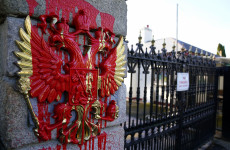Top Stories
Urgent Update: Irish Politician Cleared of Russian Spy Allegations

UPDATE: A comprehensive Garda investigation has just cleared an Irish politician, known only by the nickname Cobalt, of allegations that he acted as a Russian spy. The findings, confirmed by detectives, state that no evidence supports claims of espionage or collaboration with Russian agents.
The investigation gained momentum following a sensational report in a Sunday newspaper in October 2024, which alleged that Russian intelligence had recruited an Irish politician as an agent. This revelation sent shockwaves through Leinster House, prompting public declarations from numerous TDs and Senators asserting they were not Cobalt.
Authorities within the Special Detective Unit (SDU) of An Garda Síochána were already examining potential Russian espionage activities in Ireland before these allegations emerged. Sources indicate that Russian operatives did make approaches to the politician, but investigators found that these attempts ultimately bore no fruit.
The first contact occurred during a fact-finding mission in an Eastern European country, where the politician unexpectedly collapsed. There were suspicions that his drink may have been spiked by a potential female agent. Upon returning to Ireland, he reported the incident to Gardaí and engaged with detectives, expressing concerns over the circumstances of his collapse.
Just a few years ago, the politician experienced a second approach, this time in Ireland, from someone claiming to be a trade attaché at the Russian Embassy in Dublin. However, intelligence analysis later revealed this individual was likely a recruiter for the GRU, Russia’s military intelligence service, rather than a genuine diplomat.
Investigations suggest these attempts were part of a broader strategy by Russian agents to solicit sensitive information from Irish officials. Such recruitment tactics often involve coercion, including financial incentives or blackmail.
In March 2022, following heightened tensions due to Russia’s invasion of Ukraine, the fake trade attaché, along with four other diplomats, was expelled from Ireland for undermining the state. This expulsion underscored the ongoing concerns surrounding Russian espionage in Ireland, particularly as Irish security sources indicated that the Russian Embassy had been utilized as a hub for intelligence operations throughout Europe.
Security experts have characterized Russia’s recruitment efforts as “haphazard” and “amateurish,” suggesting a lack of understanding of the limited information available from lower-level politicians. Meanwhile, it has been determined that many Russian operatives have been trained in Ireland before being deployed to more challenging environments in the US and Europe.
In light of these developments, the SDU conducted intense questioning of the politician before the war in Ukraine began. The subsequent meeting with detectives, which included the politician’s legal representatives, was reportedly more amicable, with officials confirming in writing that no incriminating evidence had been found.
This urgent investigation highlights the ongoing challenges posed by foreign intelligence operations and the critical need for vigilance among public officials. As the situation unfolds, the implications for Irish politics and security remain significant.
Stay tuned for further updates on this developing story as authorities continue to monitor potential threats to national security.
-

 Top Stories2 months ago
Top Stories2 months agoTributes Surge for 9-Year-Old Leon Briody After Cancer Battle
-

 Entertainment3 months ago
Entertainment3 months agoAimee Osbourne Joins Family for Emotional Tribute to Ozzy
-

 Politics3 months ago
Politics3 months agoDanny Healy-Rae Considers Complaint After Altercation with Garda
-

 Top Stories3 months ago
Top Stories3 months agoIreland Enjoys Summer Heat as Hurricane Erin Approaches Atlantic
-

 World4 months ago
World4 months agoHawaii Commemorates 80 Years Since Hiroshima Bombing with Ceremony
-

 Top Stories2 months ago
Top Stories2 months agoNewcastle West Woman Patricia Foley Found Safe After Urgent Search
-

 Top Stories4 months ago
Top Stories4 months agoFianna Fáil TDs Urgently Consider Maire Geoghegan-Quinn for Presidency
-

 World4 months ago
World4 months agoGaza Aid Distribution Tragedy: 20 Killed Amid Ongoing Violence
-

 World4 months ago
World4 months agoCouple Convicted of Murdering Two-Year-Old Grandson in Wales
-

 World4 months ago
World4 months agoAristocrat Constance Marten and Partner Convicted of Infant Murder
-

 Top Stories3 months ago
Top Stories3 months agoClimbing Errigal: A Must-Do Summer Adventure in Donegal
-

 Top Stories3 months ago
Top Stories3 months agoHike Donegal’s Errigal Mountain NOW for Unforgettable Summer Views









